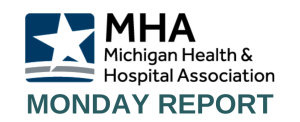The MHA is proud to have a robust set of educational and training opportunities available throughout the program year. Members are encouraged to review, share and take advantage of Spring 2024 offerings and continue to be aware of future event, webinar and educational opportunities. Members with questions may contact the MHA.
Tag: MHA
Healthcare Worker Protections Headed to Governor

 Legislation increasing penalties for violence committed against healthcare workers was approved by the state House of Representatives in a bipartisan vote during the week of Oct. 30. The MHA-supported bills increase fines for assaulting a healthcare professional or volunteer, doubling the current fines for assault and assault with a deadly weapon. House Bills (HBs) 4520 and 4521 were introduced by Reps. Kelly Breen (D-Novi) and Mike Mueller (R-Linden). A substitute adopted in committee expanded the care locations covered by the increased fines to include behavioral health facilities. Addressing violence against healthcare workers and deterring potential attacks continues to be an MHA priority. HBs 4520 and 4521 will now be transmitted to the Governor for her signature.
Legislation increasing penalties for violence committed against healthcare workers was approved by the state House of Representatives in a bipartisan vote during the week of Oct. 30. The MHA-supported bills increase fines for assaulting a healthcare professional or volunteer, doubling the current fines for assault and assault with a deadly weapon. House Bills (HBs) 4520 and 4521 were introduced by Reps. Kelly Breen (D-Novi) and Mike Mueller (R-Linden). A substitute adopted in committee expanded the care locations covered by the increased fines to include behavioral health facilities. Addressing violence against healthcare workers and deterring potential attacks continues to be an MHA priority. HBs 4520 and 4521 will now be transmitted to the Governor for her signature.
The House Health Policy Committee advanced legislation related to fetal and maternal health. HBs 5166-5173 propose several changes to state law specific to birthing parents and babies. Notably, several bills saw action in committee while stakeholders continue to work with the sponsors and committee chair on others. Several bills were approved by the committee and now move to consideration on the House floor by the full chamber:
- HB 5169, sponsored by Rep. Rachel Hood (D-Grand Rapids), would allow for mental health screenings in appropriate settings during the postpartum period. Based upon recommendations from the MHA Council on Children’s Health, the bill sponsor made several amendments to clarify timelines, recognize clinical guidance and provide flexibility in screening tools. The MHA is supportive of the amended bill.
- HB 5172, sponsored by Rep. Carol Glanville (D-Walker), would establish a state program for recognizing birthing hospitals based upon their verification through the Joint Commission’s Maternal Levels of Care. The MHA secured amendments to ensure the program is voluntary and to establish criteria to provide incentive payments to hospitals that pursue verification. The MHA supports the legislation.
- HB 5173, sponsored by Rep. Kara Hope (D-Holt), would require hospitals to provide an informational form developed by the Department of Insurance and Financial Services in consultation with the Department of Health and Human Services on the insurance enrollment process for coverage of newborns. Hospitals would be required to provide the information to parents of a child born in the hospital when the child is not covered by insurance. The MHA is neutral on this legislation following alterations made by the bill sponsor.
- HBs 5167 and 5168, sponsored by Reps. Cynthia Neeley (D-Flint) and Kimberly Edwards (D-Eastpointe), allow for coverage of blood pressure monitors by commercial insurance and Medicaid for individuals who are pregnant or within the postpartum period. The MHA is supportive of this legislation.
The Senate Health Policy committee approved Senate Bill (SB) 482, sponsored by Sen. Kristen McDonald Rivet (D-Bay City), which lifts the state’s 90 day disposal requirement on sharps containers. The MHA membership voiced concerns about the 90-day disposal requirement, sharing that it would lead to sealing and disposing of containers before they reached their ¾ fill mark. The FDA regulated containers can be costly and difficult to obtain, as hospitals experienced following a manufacturing facility fire, and further disposal of an underutilized container contributes to unnecessary and preventable medical waste. The MHA worked directly with Sen. McDonald Rivet on this legislation, based on the feedback of hospitals who shared concerns about cost, access and environmental impact. The MHA is supportive of this important policy change that will directly benefit the membership.
In addition, the Senate Health Policy Committee took testimony on SBs 633 – 637, which would allow Michigan to establish a state based health insurance exchange. 17 states and the District of Columbia currently operate state-based marketplaces and another three state have state-based exchanges that use the federal platform. Proponents argue the state exchange would provide more flexibility in state plan design and Medicaid enrollment, while concerns were raised about the cost of the program. The MHA has not taken a position on the legislation.
Members with any questions may contact Elizabeth Kutter at the MHA.
Michigan Legislators Act on Healthcare Bills

 Several bills impacting hospitals were acted upon during the week of May 9. Bills to plan for new funding from the national opioid settlement and to allow for certain out-of-state prescriptions were sent to the governor. In the Senate, testimony was taken on a bill to create a new license for dieticians and nutritionists and a bill to register certain medical labs in Michigan, and legislation to allow for certain visitors in healthcare facilities was reported to the House for further consideration.
Several bills impacting hospitals were acted upon during the week of May 9. Bills to plan for new funding from the national opioid settlement and to allow for certain out-of-state prescriptions were sent to the governor. In the Senate, testimony was taken on a bill to create a new license for dieticians and nutritionists and a bill to register certain medical labs in Michigan, and legislation to allow for certain visitors in healthcare facilities was reported to the House for further consideration.
On the House floor, the final votes were held on legislation to help guide Michigan’s use of new funding from the $26 billion national opioid settlement. Senate Bills (SBs) 993, 994 and 995 would create a new restricted fund for the state to house the settlement dollars, establish a new advisory commission appointed by the Legislature and governor to oversee spending, and prohibit future civil lawsuits related to claims covered by this fund. The bills now head to the governor’s desk for signature into law.
The Senate passed an MHA-supported bill related to out-of-state prescriptions. SB 166, introduced by Sen. Curt VanderWall (R-Ludington), would allow pharmacies to fill noncontrolled substance prescriptions written by licensed, out-of-state physician assistants and advanced practice registered nurses. SB 166 was also sent to the governor for signature.
The full Senate approved and reported to the House SB 450, which would ensure that visitors of cognitively impaired patients are permitted in healthcare facilities. Introduced by Sen. Jim Stamas (R-Midland), the bill would prohibit the director of the Michigan Department of Health and Human Services (MDHHS) or a local health officer from issuing an order that prohibits a patient representative from visiting a cognitively impaired individual in a healthcare facility. As written, the legislation does not prevent a healthcare facility from implementing reasonable safety measures for visitors and will still allow for facilities to limit the number of representatives per patient. The MHA is neutral on the bill and will continue to monitor any action taken in the House.
Further testimony was held in the Senate Health Policy and Human Services Committee on SB 614, which would create a new license for both dieticians and nutritionists in Michigan. Under the current language, a single license would be used for both professions. There was no vote held on SB 614, as the bill sponsor Sen. Michael MacDonald (R-Macomb Township) is working to address concerns from the Michigan Department of Licensing and Regulatory Affairs on the implementation of the dual licensure. The MHA supports SB 614 and looks forward to working with the stakeholders on potential improvements.
Questions on these issues or other state legislation related to healthcare can be directed to Adam Carlson at the MHA.
MHA Monday Report April 25, 2022

Senate Moves Appropriations Subcommittee Budgets and Advances Opioid Settlement Legislation
The Michigan Senate Appropriations Subcommittee on Health and Human Services reported out April 20 their budget recommendation for the fiscal year 2023 budget beginning Oct. 1. Senate Bill 828 protects hospital priorities including maintaining funding for the Healthy Michigan Plan …
DIFS Utilization Review Decisions Favor Hospitals
The Michigan Department of Insurance and Financial Services (DIFS) issued in early April two important utilization review decisions in favor of hospitals related to auto no-fault insurance reimbursement. Under the new system enacted as part of Public Act 21 of 2019, hospitals …
LARA Rules Requiring Implicit Bias Training Take Effect June 1
The Department of Licensing and Regulatory Affairs (LARA) revised Public Health Code Rules requiring implicit bias training for all professions licensed or registered under the Public Health Code, except for Veterinary Medicine, effective June 1. …
CMS Releases FY 2023 Proposed Rule to Update Hospital IPPS
The Centers for Medicare & Medicaid Services (CMS) recently released a proposed rule to update the Medicare fee-for-service hospital inpatient prospective payment system for fiscal year 2023. When all proposed changes are considered, the rule is expected to result in a net decrease …
Cybersecurity Member Forum Scheduled for June 2
The MHA will host a cybersecurity member forum from 9 a.m. to 3 p.m. June 2 at the Henry Center for Executive Development. Increasing cybersecurity threats support the need for leaders to identify vulnerabilities of medical devices and supply chains, to select staff who can lead threat mitigation …
Long-term Acute-care Hospital Payment System Proposed Rule Released
The Centers for Medicare & Medicaid Services recently released a proposed rule to update the Medicare fee-for-service long-term care hospital prospective payment system for fiscal year 2023. …
Webinar Focused on Long-Term Goal Planning and Accountability
Successful stewardship of an organization is central to the role of governance. In many boardrooms, an inward, short-term operational focus robs governing boards of their attention to external forces and long-term strategic imperatives. It takes discipline and a symbiotic relationship between the board …
Nurse Preceptor and Clinical Faculty Academy Available Online
New nurses can be overwhelmed with responsibilities, which is why nurse preceptors make a difference. Nurse preceptors help new nurses develop their professional identity, access appropriate clinical research and learn from mistakes. …
The Keckley Report

Why Not-for-profit Hospitals Are Soft Targets
“Last week, the Lown Institute issued its latest report card on not-for-profit hospitals finding most undeserving of their tax breaks. …
“In response, the American Hospital Association (AHA) released a statement criticizing the Lown Institute’s ‘faulty methodology’ and defending hospitals’ use of financial resources.”
Paul Keckley, April 18, 2022
